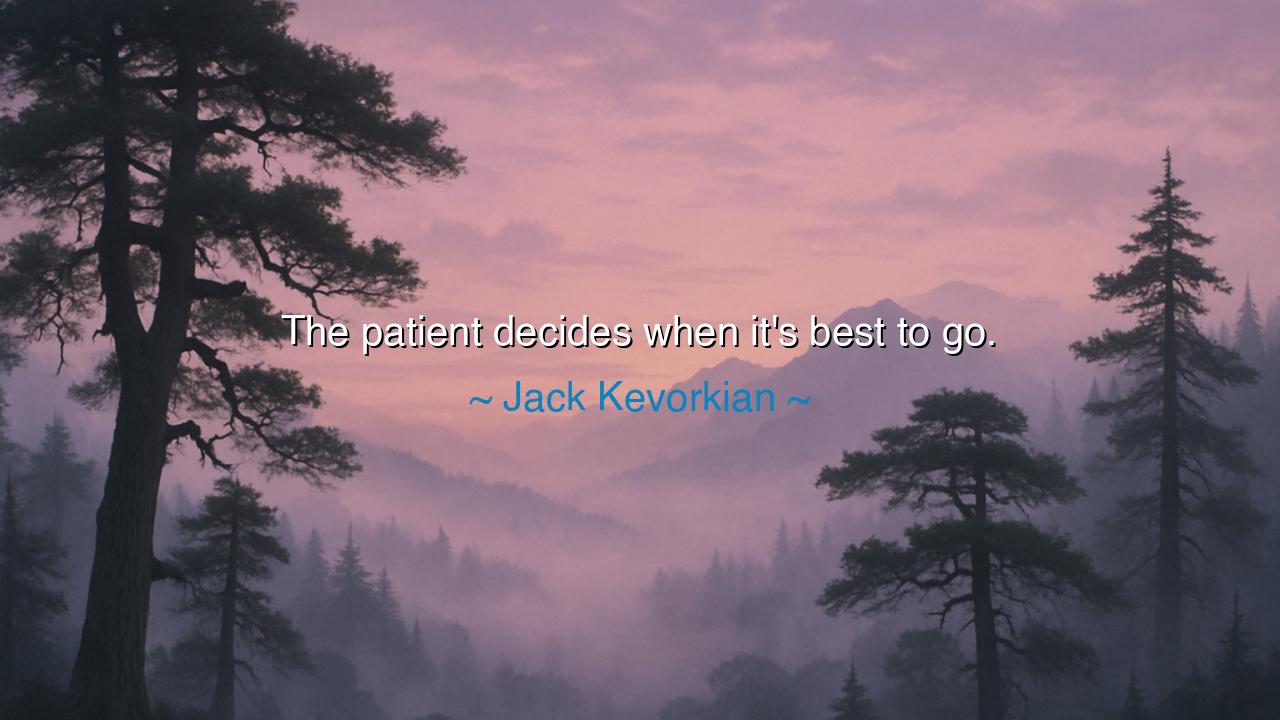
The patient decides when it's best to go.






In the realm of life and death, there are few subjects as profound, as personal, or as fraught with moral complexity as the decision of when to let go. The words of Jack Kevorkian, "The patient decides when it's best to go," encapsulate the deepest of human freedoms: the autonomy over one's own fate. This quote, though stark, reminds us that the final choice, in moments of suffering and pain, lies with the individual, not with society, nor with the laws, but with the very person whose life is in question. It asks of us a delicate reflection on the nature of death, choice, and dignity.
To the ancients, the concept of self-determination in life and death was not foreign. In Stoic philosophy, figures like Seneca and Epictetus spoke often of the importance of accepting death with grace and wisdom, and of understanding that it is the natural conclusion to the cycle of life. They did not shy away from the fact that death would come, but instead taught that the way one faced death should be determined by their own understanding of life, not by fear or societal imposition. The decision of when to die, in the Stoic sense, was not simply a matter of time—it was a matter of choosing how to meet the end of life with the same integrity and control that one brought to their living years.
In this light, Jack Kevorkian’s words resonate as a modern echo of ancient wisdom. The idea that the patient, the individual suffering, is the one who holds the power over their life’s conclusion is an assertion of the ultimate human right: the right to self-determination. It is a powerful declaration that no matter the circumstances, no matter the pain or suffering, the individual is the arbiter of their own fate. Just as Socrates, when faced with death by the courts of Athens, chose to die with dignity, even in the face of unjust punishment, so too does the patient in Kevorkian’s view have the right to choose the manner and timing of their own passing.
Consider the life of Hannibal Barca, the great Carthaginian general. He faced the bitter loss of his empire, the collapse of his dreams, and the crushing weight of defeat at the hands of Rome. When all hope seemed lost, rather than face the humiliation of capture, he chose to end his life on his own terms. His death was not one of cowardice, but of autonomy—an assertion of control in a world where he had lost everything else. Much like Hannibal, those who suffer deeply and endlessly may choose to reclaim their dignity by deciding when the end comes. This is not a surrender to fate, but rather a final act of defiance and self-sovereignty.
The significance of Kevorkian’s words speaks not only to those who suffer but to society at large. It calls us to reflect on the dignity of human life, and the freedom that each person should have to decide their own path, especially in the final moments. For those who are imprisoned by illness, pain, or debilitation, the decision to die is a reclaiming of agency, a final act of self-determination. This quote challenges us to ask, do we respect the will of the individual? Do we honor their autonomy in life, and in death? These are questions that stir the soul, forcing us to examine the ways in which we value and respect the rights of others in their most vulnerable moments.
History teaches us that those who choose their own death are not always doing so out of weakness, but out of profound strength. The great philosopher Mahatma Gandhi once said, “A man who takes his own life, when all else is exhausted, may well be asserting the strongest form of dignity he can muster.” This echoes the deeper meaning of Kevorkian’s words. Sometimes, in the face of unbearable suffering, the choice to go is not a surrender, but a final act of strength and personal authority over one’s own existence.
The lesson to be learned from Kevorkian’s quote is one of empowerment and compassion. It teaches us that every individual should have the right to make decisions about their life, including how and when it ends. It challenges us to respect not only the choices of others, but also to examine our own lives, to reflect on the choices we make each day, and how we honor the autonomy of those around us. In offering the power of decision to the individual, we not only acknowledge their suffering, but we also affirm their dignity. Therefore, let us move forward with both compassion and respect, mindful that each soul deserves the right to walk their own path, even when that path leads to the end.






AAdministratorAdministrator
Welcome, honored guests. Please leave a comment, we will respond soon